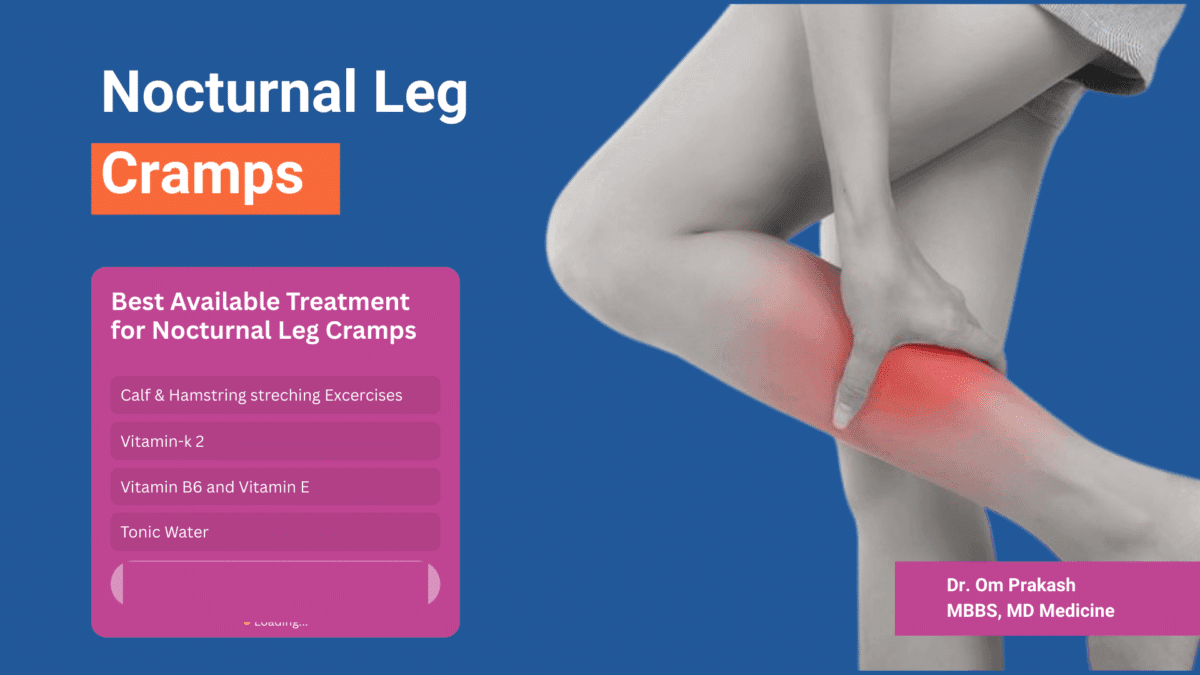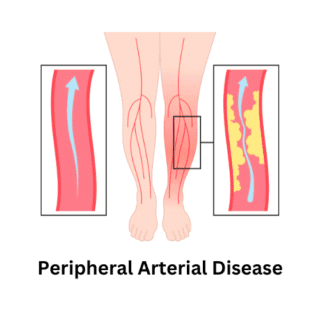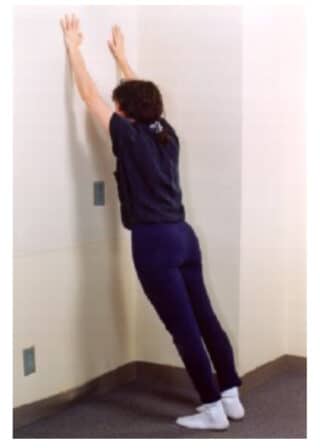
Picture this: You’re sound asleep, enjoying a peaceful night, when suddenly, a sharp pain shoots through your leg, jolting you awake. Nocturnal/Nighttime leg cramps are painful, involuntary muscle contractions usually affecting the calf and foot that can disrupt rest and leave you sore for hours. While they’re often harmless, frequent cramps may be a sign of an underlying health concern. If leg cramps interfere with your sleep, Dr Om Prakash, MBBS, MD (Internal Medicine), a top “Internal Medicine Specialist General Physician in Noida”, offers expert care and solutions.
Understanding Nighttime Leg Cramps
Nocturnal/Nighttime leg cramps occur when muscle fibers tighten unexpectedly and refuse to relax. These spasms typically affect the calf muscle but can also strike the thighs (Hamstring Muscle) or feet. They range from mild discomfort to severe pain, sometimes lasting several minutes, followed by lingering soreness. In the general population, 40% have nocturnal/Nighttime leg cramps.
What Causes Leg Cramps at Night?
Uncovering the root cause of leg cramps is essential for effective management. Here are some common triggers:
1. Electrolyte Imbalance
Your muscles rely on minerals like magnesium, potassium, and calcium to function properly. When these levels dip, muscle cramps can occur. Possible reasons include:
- Nutritional Deficiency: Poor dietary choices, lacking fruits and leafy greens
- Excessive sweating (common among athletes and those in hot climates)
- Pregnancy (higher nutrient demand)
2. Dehydration
Not drinking enough water, excessive sweating, fluid removal during hemodialysis and due to the use of diuretics can cause muscle irritation and increase the likelihood of cramps. If you consume large amounts of caffeine or alcohol, dehydration risk is even higher.
3. Muscle Overuse or Inactivity
- Strenuous Exercise: Intense workouts without proper stretching can overwork muscles, leading to frequent leg cramps in Night
- Prolonged Standing or Sitting: Standing for long hours or sleeping in an awkward position can strain muscles and trigger cramps.
4. Underlying Health Conditions
Chronic leg cramps may be linked to medical conditions such as:
- Diabetes, Thyroid Disorders & Chronic kidney disease: These can affect nerve and muscle function.
- Peripheral Vascular Disease: Poor circulation (PAD) and venous insufficiency (Varicose vein) can deprive muscles of oxygen, leading to cramps and claudication
- Medications: Long-acting beta-agonists ( used in COPD & Asthma Inhalers & Rotacaps), Thiazide/potassium-sparing diuretics, oral contraceptive pills and statins may cause muscle cramping.
- Sleep disorders: Secondary nocturnal muscle cramps can occur in association with restless legs syndrome (RLS), Periodic leg movement of sleep (PLMS) and obstructive sleep apnea (OSA)
5. Exercise-associated muscle cramping:
Exercise-associated muscle cramping ( Heat cramps) is defined as an involuntary, painful contraction of skeletal muscle during and after exercise mainly because of dehydration, electrolyte imbalance and imbalance of afferent and efferent control at the motor axon
How to Prevent Recurrent Nighttime Leg Cramps
Preventing muscle cramps starts with simple lifestyle changes. Here’s what you can do:
1. Stay Hydrated
Drink at least 8–10 glasses of water daily to maintain muscle function. After intense workouts, replenish electrolytes with coconut water or a pinch of Himalayan salt in water.
2. Eat a Nutrient-Rich Diet
Electrolyte deficiency should be corrected with supplements and foods to boost essential minerals:
- Magnesium: Found in dark chocolate, almonds, and spinach.
- Potassium: Available in bananas, sweet potatoes, and white beans.
- Calcium: Found in dairy, chia seeds, and fortified plant-based milk.
3. Stretching exercise for all patients
For all patients with Nighttime nocturnal leg cramps, gentle stretching exercises of the posterior leg muscle (calf & hamstring) can reduce muscle tightness and prevent cramps. Try these exercises:
- Calf Stretching Exercise: Stand facing the wall, feet together, about 1 foot from the wall. With the heels firmly on the floor and the body aligned straight at the hips and knee, lean forward to the wall, stretching the posterior leg muscle. Hold this position for 30 seconds. Repeat 5 times per session, at least two sessions daily.
4. Improve Your Sleeping Posture
- Avoid heavy blankets pressing on your feet.
- Back sleepers: Place a pillow under your knees.
- Side sleepers: Sleep with a pillow between your legs for support.
5. Stay Active: Daily movement improves circulation and reduces the likelihood of cramps. Try a 15-minute evening walk, and avoid sitting or standing in one position for too long.
What to Do When a Leg Cramp Strikes: Treatment of Acute Leg Cramps: Stretching
If you wake up with painful muscle cramps in your leg, these quick remedies can help:
- Toe Pull (Forcefully contact the opposing muscle group to stretch the affected muscle): Sit up, straighten your leg, and gently pull your toes toward your body.
- Hot Shower: a hot shower with the water directed towards the affected muscle for five minutes, or use a warm towel to relax
- Ice Massage
- Walk It Off: Slowly walk for a few minutes
Available Drug Therapy: For Nighttime Leg Cramps
Patients who fail to respond to initial stretching exercises may require treatment with prescription medicine for 4-8 weeks
- Vitamin B6 30 mg + Vitamin E 800 IU
- Vitamin K2, 180 micrograms daily
- Calcium channel blockers like diltiazem 30 mg or verapamil 120-180 mg taken at night
- Gabapentin 300 mg, pregabalin 75 mg and baclofen 10 mg
When to See a Doctor
Occasional leg muscle cramps are normal, but frequent or severe episodes may indicate a deeper issue. Consult Dr. Om Prakash, Noida’s best Internal Medicine Specialist General Physician Doctor if you experience:
- Frequent Leg Muscle Cramps (occurring multiple times per week)
- Swelling, Redness, or Pain (could indicate a blood clot or vein issues)
- Numbness or Weakness (possible nerve damage or diabetes complications)
- Persistent Cramps Despite Lifestyle Changes
Book Instant Appointment with Noida’s Best Internal Medicine Specialist General Physician For the Treatment of Nocturnal/Nighttime Leg Cramps
With years of experience in internal medicine and non-invasive cardiology, Dr. Om Prakash specialises in diagnosing and treating muscle cramps, circulatory disorders, and nerve-related issues. Whether you need a comprehensive health checkup or targeted treatment for muscle cramps, his expert guidance can help you find relief.
For a consultation, visit Dr. Om Prakash’s clinic in Noida or call 079824 54504 to book an appointment.
Final Thoughts
Nighttime leg cramps can disrupt sleep and daily life, but the right strategies can prevent them. Stay hydrated, eat nutrient-rich foods, stretch, and maintain an active lifestyle to keep muscle cramps at bay. If cramps persist, don’t ignore them consult Dr. Om Prakash, Noida’s trusted internal medicine specialist, General Physician doctor, for accurate diagnosis and treatment.
Dr. Om Prakash MBBS, MD Internal Medicine
Internal Medicine Specialist Consultant Physician
